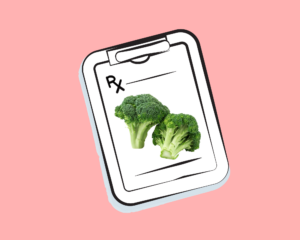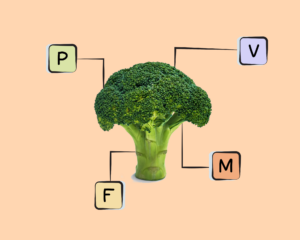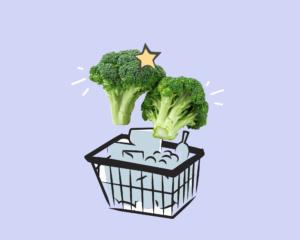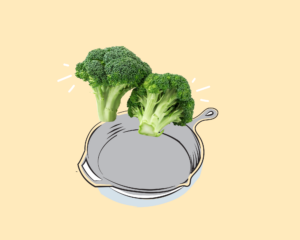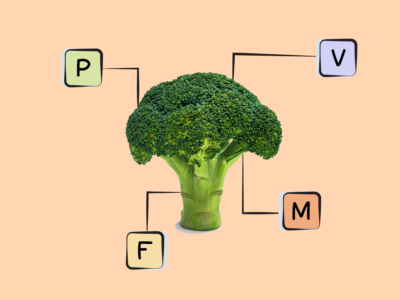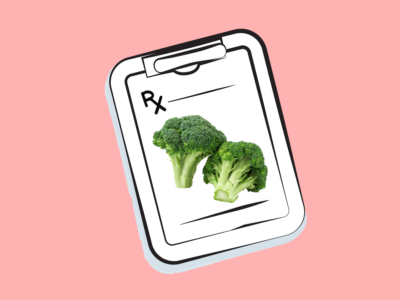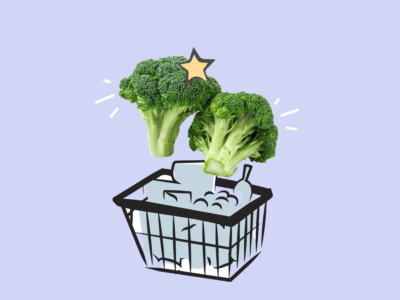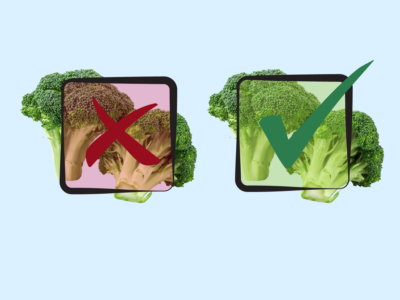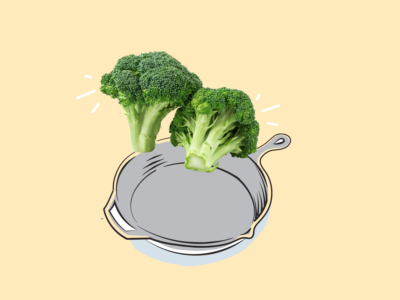Health Benefits of Broccoli
Broccoli (Brassica oleracea) is a member of the cruciferous vegetable family, also known as brassicas or the cabbage family. This whole family of vegetables are super beneficial for our health. In fact, one study found that people who consumed about 2 servings per day of cruciferous vegetables, including broccoli, had a 22% reduced risk for total mortality and 31% reduced risk for cardiovascular disease mortality compared to people who ate only about one serving per week.

And studies looking at broccoli specifically have shown that it can improve blood sugar regulation, reduce LDL the bad kind of serum cholesterol while increasing HDL the good kind of cholesterol, as well as reducing markers of inflammation! No wonder eating broccoli reduces risk of coronary artery disease, a type of heart disease! And, that’s not all! Another study showed that postmenopausal women who ate about 11 servings of broccoli per month had a 40% lower risk of breast cancer compared to those who had 3 servings or less per month.
Broccoli can improve heart health by improving blood sugar regulation, serum cholesterol (decreasing LDL and increasing HDL cholesterol levels) and reducing inflammation!
Broccoli sprouts are also associated with health benefits. Studies have shown that eating broccoli sprouts, or supplementing with broccoli sprout extract, improve serum cholesterol (reducing LDL and increasing HDL cholesterol), reduce inflammation, and improve blood sugar regulation in type 2 diabetes.
For more details and other little-known broccoli benefits (like preventing non-alcoholic fatty liver disease), read Health Benefits of Broccoli.
Health Benefits of Broccoli
Eating broccoli results in an overall improvement to general health, and reduces risk of cancer, cardiovascular disease, and type 2 diabetes, in addition to other health benefits!
Nutrients in Broccoli
So, what is it about broccoli that makes it so great for our health?
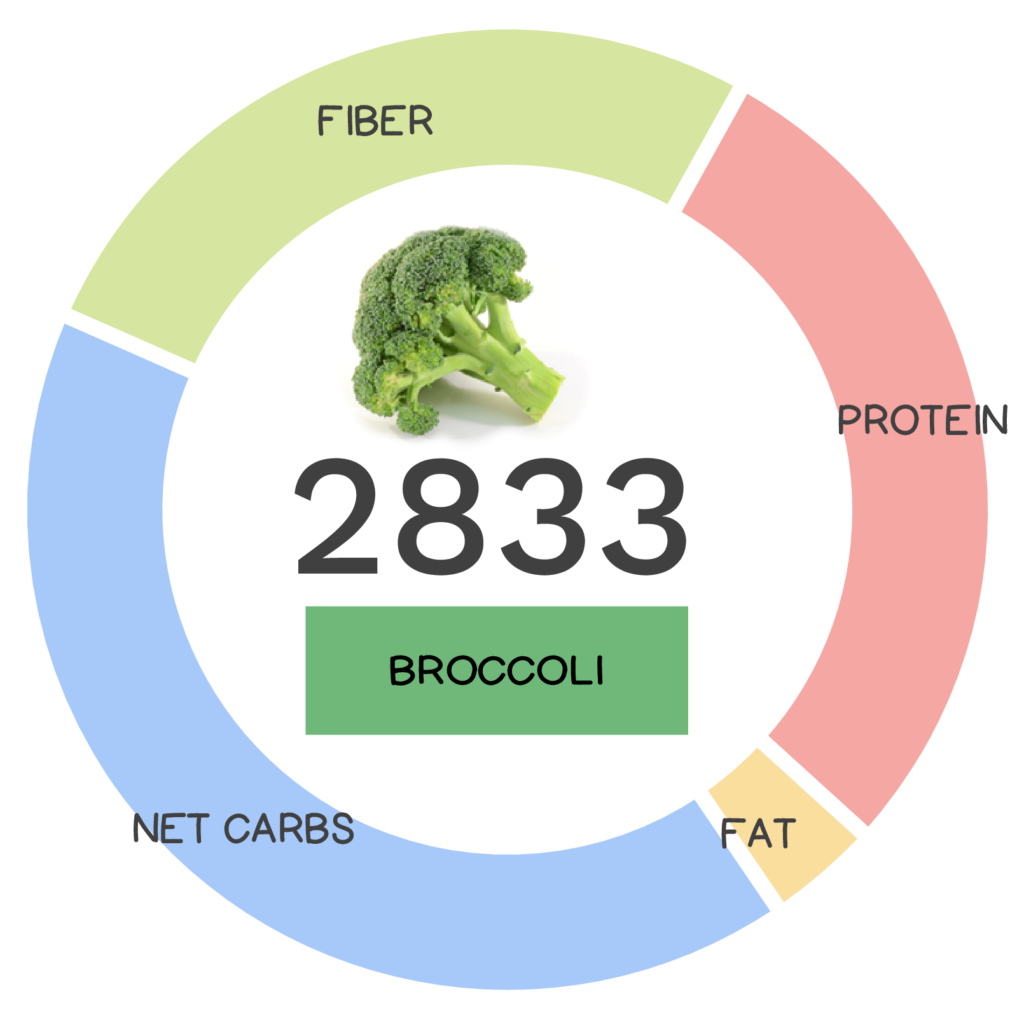
Well for starters, it’s one of the most nutrient dense foods on the planet, meaning it delivers a whole lot of nutrients per calorie. In fact, broccoli has an impressive Nutrivore Score of 2833! That’s more than 10 times more nutrition per calorie than chicken breast and 18 times more nutrition per calorie than multigrain bread.
A one-cup serving of raw broccoli, which is just over half a cup cooked, is an excellent source of vitamin B7 (biotin), vitamin C, vitamin K, and phytonutrients (especially polyphenols, which are great antioxidants, and glucosinolates, which have cancer prevention properties). In fact, just one serving of broccoli (1 cup raw broccoli florets) provides 90% of the daily value of vitamin C, about three quarters of your vitamin K and 20% of your biotin.
Plus, broccoli is a good source of vitamin B5 (pantothenic acid) and vitamin B9 (folate)! A serving of broccoli also provides 2.6 grams of protein, 2.4 grams of dietary fiber, but only 1.3 grams of net carbohydrates, making it a low-carb veggie.
And, here’s the awesome part, eating broccoli delivers these high levels of nutrients for only 31 calories!
Broccoli also contains notable amounts per calorie of many other important nutrients, too, including: calcium, copper, iron, magnesium, manganese, phosphorus, potassium, selenium, zinc, vitamin A, vitamin B1 (thiamine), vitamin B2 (riboflavin), vitamin B3 (niacin), vitamin B6 (pyridoxine), vitamin E, choline, beta-carotene, lutein and zeaxanthin. Yes, this dark green veggie really is a superstar!
But, the really special thing in broccoli is a class of phytonutrients called glucosinolates, which are well known for their antioxidant effects (meaning they combat free radicals) and cancer prevention benefits. Broccoli specifically contains a glucosinolate called glucoraphanin which gets converted an extra awesome phytonutrient called sulforaphane!

Sulforaphane has so many beneficial properties! In addition to its antioxidant and anticancer properties, sulforaphane can increase protective antioxidant enzymes in the body as well as phase II detoxification enzymes. It improves glycemic control in patients with insulin resistance and even poorly controlled type 2 diabetes. It has powerful anti-inflammatory effects, delays progression of osteoarthritis, and is cardioprotective, meaning it’s great for heart health. Sulforaphane has even shown efficacy for neurodegenerative diseases, including Alzheimer’s, Parkinson’s, and multiple sclerosis. Yep, sulforaphane is super cool, and can only be found in cruciferous vegetables like broccoli.
Broccoli has the most nutrition when eaten raw, but we can still enjoy the health benefits of broccoli when we eat it cooked! The best broccoli cooking method to retain nutrients is steaming. Steamed broccoli loses about 19% of its glucosinolates (including sulforaphane) and maintains its vitamin C content, but boiled broccoli loses 55% of its glucosinolates and 33% of its vitamin C.
For more detailed nutrition facts about broccoli, read Broccoli Nutrients.
Broccoli Nutrients
Broccoli has an impressive Nutrivore Score of 2833, which makes it a super nutrient-dense food! It’s particularly high in beneficial phytonutrients (especially glucosinolates and polyphenols), vitamin C, vitamin K, and vitamin B7 (biotin).
Why Some People Don’t Like Broccoli
So, what if broccoli tastes gross to you? Well, if that’s the case, you might be a bitter supertaster!
The glucosinolates in cruciferous vegetables chemically resemble phenylthiocarbamide (PTC), an organic molecule with the very unusual property that it either tastes very bitter or is virtually tasteless depending on which variant of a taste receptor gene, called hTAS2R38, you have! About 70% of us can detect a bitter taste in cruciferous veggies, and about 20% of us have two copies of the bitter sensitivity gene and if that’s you, you’re much more likely to hate cruciferous vegetables, eat fewer vegetables in general, and gravitate towards sweet treats!

But, don’t worry! There’s still ways you can develop a preference for broccoli!
Try blanching it before you cook it to leach out some of the bitter compounds. To do this, bring water to a boil in a large pot. Add your broccoli to the pot and cook for one to two minutes. Immediately transfer to ice water. Then, roast it, stir fry it, or use it as a dipping veggie! You might also find that balancing the bitterness with some astringency or acidity, such as tossing roasted broccoli with lemon juice or a vinaigrette, may help too.
And, studies show that pairing a bitter vegetable that we don’t like with something we really love can help us develop a food preference for that bitter veggie! That’s because our brain starts to associate the flavor with something delicious! So, think about something really yummy you can always eat with broccoli. (The studies that tested this paired Brussels sprouts with sweetened cream cheese, which seems a little unusual to me, so don’t worry if the yummy food you’re eating with your broccoli isn’t a traditional pairing.)
It can also help to give up hyperpalatable manufactured foods, think fast food and junk food that has lots of ingredients, including that addictive combination of salt, sugar and fat. That’s because these foods cause our tastebuds to be less sensitive to the more subtle flavors in whole foods like fruits and vegetables, along with increasing dopamine, which is why it feels so good to eat these foods but also why eating them drives cravings and makes whole foods seem boring. The good news? Studies show that it only takes a few weeks for our tastebuds to adapt to healthier foods, so much so that we prefer them!
For more practical tips on how to shop, select, store and prepare broccoli, see Broccoli Practical How-To.
Broccoli Practical How-To
We’ve got you covered with practical tips for shopping, choosing, storing, growing (broccoli or sprouts), harvesting, and cooking broccoli! Learn how to cook broccoli to retain nutrients as well as preparation tips for people who hate it!
Take-Home Message
So, to summarize, broccoli is a super awesome vegetable for our health with huge measurable benefits when we consume it at least a couple of time per week. And we can maximize the health benefits of cruciferous vegetables, the veggie family broccoli belongs to, by eating one or two servings from this family every day. The reason why broccoli is so great is that it’s both super nutrient-dense and contains some really special phytonutrients. So, if you love broccoli, yay, all the more reason to eat it often! And, if you hate it, there’s lots of ways to trick yourself into developing a liking for it, even if you’re a bitter supertaster! It’s worth the effort because broccoli truly is a superfood.
In fact, I love broccoli so much, I wrote an Ode to Broccoli!
And, if you’re looking for inspirational broccoli recipes, check out my Broccoli Recipe Round-Up.
Broccoli Recipe Round-Up
While you may already have your favorite family recipes for eating broccoli florets, now that you know how healthy the leaves, stems and sprouts are you might be looking for a way to incorporate them into your diet too. For the leaves, try substituting in recipes where you typically use kale, swish chard or collard …



